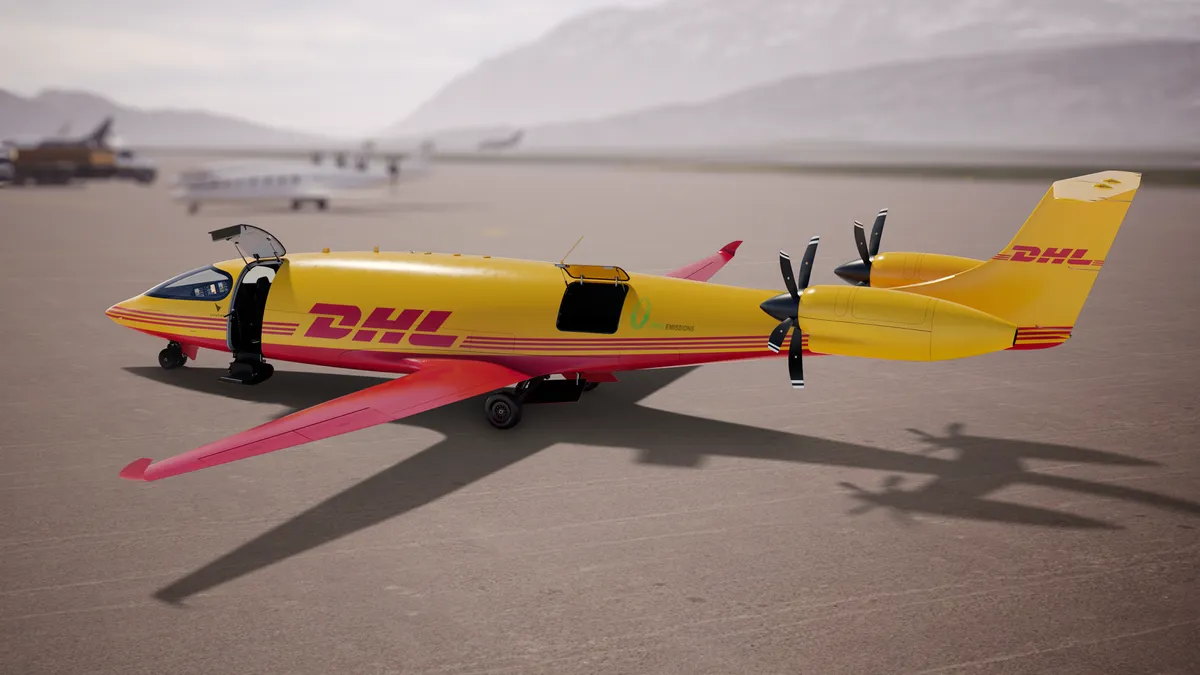Dive Brief:
- DHL Express ordered 12 electric aircraft from Eviation, a new part of its push toward "zero-emission logistics" while addressing higher air transport demand, according to a press release.
- Eviation expects to deliver its Alice aircraft to DHL Express in 2024. DHL Express will use them for regional feeder routes starting in the U.S., primarily for the Southeast and West Coast, a spokesperson said.
- Electrifying every transport mode is a crucial step in Deutsche Post DHL Group's goal of zero emissions by 2050, DHL Express CEO John Pearson said in a statement. Other steps the company is taking include electrifying its last-mile delivery fleet and increasing its use of sustainable aviation fuel.
Dive Insight:
DHL Express and other air transportation companies are exploring ways to reduce their carbon footprint on aircraft large and small as sustainability becomes a growing priority for shippers. Increased consumer interest in sustainably-made products triggered more investment in sustainable aviation, said Glyn Hughes, director general of The International Air Cargo Association.
"Consumers are raising their expectations of what they want from people who they are doing business with, and that in turn is leading to manufacturers looking at their supply chains," he said.
For some shippers, that means cutting back on air transport. L'Oreal determined that reducing the use of air freight would have an outsized impact on its emissions and shifted volume to more sustainable transport modes.
The aviation industry is adapting to this new mindset. UPS announced in April it would buy 10 electric vertical aircraft from Beta Technologies for time-sensitive deliveries in small- and medium-sized markets. Lufthansa Cargo and DB Schenker offer a 100% greenhouse gas-neutral flight between Europe and Asia on a Boeing 777F, powered by fuel "produced primarily from biomass waste, for example from used vegetable and cooking oils," according to a May news release.
DHL Express is looking to reach zero emissions while addressing a spike in demand for its international express transportation services. Time-definite international shipment volume in Q1 increased by more than 25% YoY, which DHL attributed to the growth of e-commerce. This means more cargo flight activity and, consequently, more aircraft emissions.
To counter emissions spurred from higher volumes, DHL Express said it plans to increase its use of sustainable aviation fuel to more than 30% by 2030, in addition to integrating newer, more fuel-efficient aircraft into its long-haul intercontinental fleet.
Large freighters like the Boeing 777F, which can fly 4,880 nautical miles and carry a max payload of more than 226,000 pounds, are a growing part of the company's fleet.
For shorter flights, all-electric aircraft are one way DHL aims to reduce its carbon footprint. Eviation's Alice can carry 2,600 pounds, has a maximum range of 440 nautical miles and is best suited for feeder routes, the release said.
It also requires 30 minutes or less to charge per flight hour, and it can be charged during loading and unloading operations, which allows it to maintain DHL Express' tight delivery schedules, according to the release.
But Hughes said all-electric, all-cargo flights will soon advance beyond feeder routes.
"Probably within a 10-year timeframe, we're talking about significantly longer ranges with significantly larger payloads," he said.













